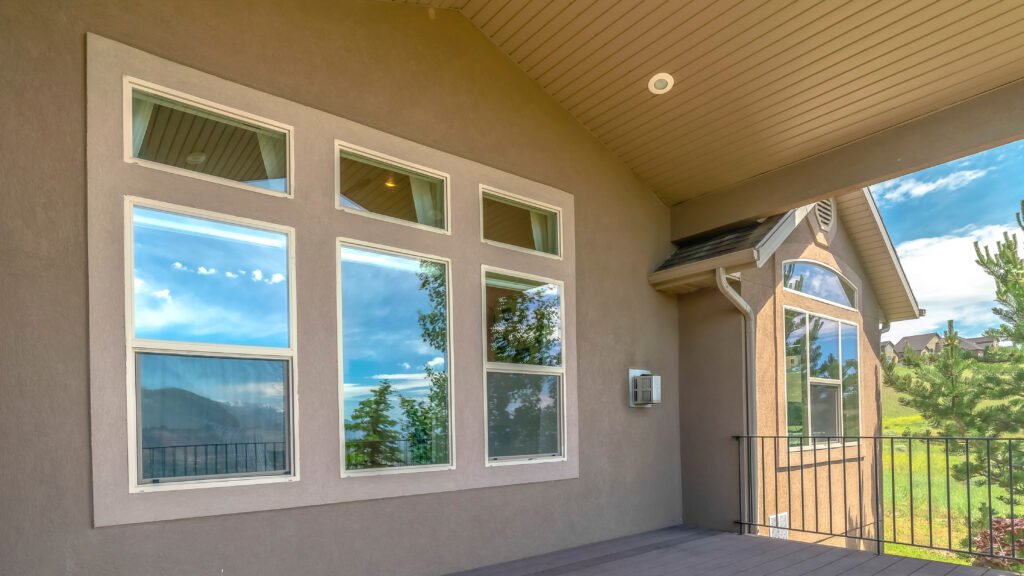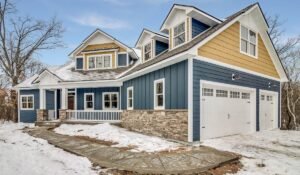Vinyl windows
Let’s explore the arguably most popular replacement window material on the market: vinyl windows. I will cover how they are made, their advantages, such as durability and energy efficiency, and their disadvantages, including limited color options, possibly expansion and contraction from temperature variations, and suitability for historic homes.
We will also compare vinyl windows to fiberglass and wood windows in terms of cost, durability, and maintenance. We will discuss the average cost of vinyl windows and why someone should consider buying them for their home, but also why they may only be suitable for some.
Whether you are looking to upgrade your windows or simply curious about vinyl windows, this article will provide you with all the information you need to make an informed decision.

Vinyl window basics?
Vinyl windows are a popular choice for homeowners looking for durable, cost-effective window solutions. They come in various types, including engineered vinyl, composite vinyl, and standard vinyl, offering a range of options to suit different needs.
Composite vinyl windows combine the best features of wood and vinyl, providing a classic look with modern durability. Meanwhile, standard vinyl windows are a budget-friendly option that still offers excellent energy efficiency. Vinyl windows are typically made from a combination of vinyl materials, such as PVC, engineered vinyl, and composite vinyl. Some manufacturers use a PVC blend to enhance the windows’ durability and flexibility.
What Are the Advantages of Vinyl Windows?
Vinyl windows offer numerous advantages, including exceptional durability, flexibility, and cost-effectiveness. They are known for their long-lasting performance and are a popular choice among homeowners seeking high-quality window solutions. Vinyl is the most popular choice of replacement windows on the market, allowing consumers to choose from numerous brands and variations that will fit anyone’s budget.
Low Maintenance
One of the key advantages of vinyl windows is their low maintenance requirements. They are designed to withstand the elements and maintain their appearance over time, providing long-lasting performance and longevity. Vinyl windows are known for their exceptional resistance to wear and tear, making them a popular choice for homeowners looking for durable and hassle-free windows. Unlike wood windows, vinyl windows do not require frequent repainting or specialized cleaning, saving time and money in the long run.
To ensure the extended durability of vinyl windows, it’s essential to perform regular basic maintenance tasks such as cleaning with mild soap and water, checking for any signs of damage, and lubricating the moving parts when necessary. By following these simple maintenance routines, homeowners can enjoy the benefits of their vinyl windows for years to come.
Energy Efficient
Vinyl windows are known for their energy efficiency, helping homeowners reduce heating and cooling costs. Many vinyl window models are ENERGY STAR certified, indicating their superior energy-saving capabilities. One of the key energy-efficient features of vinyl windows is their excellent insulation properties. The frames are designed to minimize heat transfer, ensuring your home stays comfortable year-round without over-relying on heating or cooling systems. Modern vinyl windows often come with multiple panes of glass filled with insulating gas, further enhancing their thermal performance.
The design of vinyl windows includes tight seals that prevent air leakage, reduce drafts, and maintain a consistent indoor temperature. This airtight construction boosts energy efficiency and contributes to a quieter and more comfortable living environment.
Cost-effective
One of the primary benefits of vinyl windows is their cost-effectiveness. They offer a budget-friendly window solution without compromising quality or performance, making them a popular choice for homeowners looking to upgrade their windows. Vinyl windows provide excellent insulation, helping to maintain a consistent indoor temperature and reduce heating and cooling costs. Over time, this energy efficiency can result in significant financial benefits for homeowners, making vinyl windows, like most other replacement windows, a wise choice for their ongoing savings in the years to come.
Durable
Thanks to their composite material construction, vinyl windows are very durable. They offer a high-quality window option that can withstand various environmental conditions and provide long-lasting performance. This durability ensures that vinyl windows maintain their aesthetic appeal and functionality for years, requiring minimal maintenance. These windows are built to last, standing up to impacts( I will say I have seen hail cause damage to vinyl windows) and moisture exposure without compromising their structural integrity.
Limited Color Options
One drawback of vinyl windows is the limited color options available compared to other window materials. This limitation may restrict homeowners looking for specific aesthetic choices for their homes. A limited color palette can make it challenging for homeowners to match the windows with their existing exterior design or desired color scheme. It may also pose difficulties in creating a cohesive and visually appealing look for the property, as the windows play a crucial role in enhancing the overall curb appeal. The availability of only a few color options may limit the customization opportunities, leading to a less tailored and unique finish.
These factors highlight the importance of color options in window selection to achieve the desired aesthetic outcome.
Vinvyl can Expand and Contract in Extreme Temperatures
In adverse temperature conditions, vinyl windows may experience expansion and contraction, which can impact their performance and longevity over time. Homeowners in regions with severe temperature variations should consider this factor when choosing vinyl windows.
When exposed to high heat, vinyl windows can expand, leading to potential issues such as warping or bowing. Conversely, in cold temperatures, contraction may occur, causing gaps and air leaks. These fluctuations can compromise the insulation properties of the windows, resulting in reduced energy efficiency and increased utility costs.
To mitigate these effects, homeowners should opt for vinyl windows with features like fusion-welded frames and energy-efficient glass options. Regular maintenance, such as lubricating hinges and weatherstripping, can also help prolong the windows’ lifespan and ensure optimal performance in extreme climates.

How Do Vinyl Windows Compare to Fiberglass and Wood Windows?
When comparing vinyl windows to fiberglass and wood windows, one key factor to consider is durability. Vinyl windows, known for their longevity and resistance to elements, offer a durable alternative to wood windows. Unlike wood windows, which can swell or rot when exposed to rain or humidity, vinyl windows maintain their shape and integrity over time, showcasing superior durability. Fiberglass is stronger and more durable than vinyl. It is also less prone to expansion and contraction. However, these advantages come at a premium price.
Cost
In terms of cost, vinyl windows are generally more affordable than fiberglass and wood windows, making them a cost-effective choice for homeowners looking to upgrade their windows without breaking the bank.
While fiberglass and wood windows may have their own aesthetic appeal and durability advantages, the upfront cost of vinyl windows is significantly lower. Homeowners can enjoy savings during the initial purchase and in the long run due to the low maintenance required for vinyl windows. Vinyl windows are known for their energy efficiency, helping reduce heating and cooling costs over time, which further adds to their overall value for money.
Maintenance
Vinyl windows require minimal maintenance compared to fiberglass and wood windows. They are easy to clean and maintain, reducing the time and effort needed to keep them in optimal condition. Unlike wood windows that may need sanding, repainting, or sealing periodically, vinyl windows only require simple cleaning with soap and water. This makes them a convenient option for homeowners looking for low-maintenance window solutions.
Regular vinyl windows can be cleaned by wiping them down with a mild detergent and water solution using a soft cloth or sponge. This helps prevent dirt buildup and keeps the windows looking bright and new for years to come.
What Is the Average Cost for Vinyl Windows?
The average cost for vinyl windows can vary depending on factors such as size, style, and additional features. On average, homeowners can expect to pay between $300 to $800 per window for standard vinyl options. Factors affecting the cost of vinyl windows include the window size, the style chosen, and any additional features like energy-efficient coatings or unique designs. Manufacturers may also impact the price, with premium brands costing more than basic options. Installation costs should also be considered, as professional installation can add to the overall expenses.
To help homeowners budget for vinyl window replacements, researching different suppliers and comparing quotes can provide an idea of the current market prices. Setting a budget based on the total number of windows to be replaced and the quality desired is crucial. Planning for unexpected expenses by allocating a contingency fund can ensure that the project stays within budget.
Why Should you Buy Vinyl Windows?
Homeowners should consider buying vinyl windows because they are affordable, energy efficient, and require minimal upkeep. These windows offer a cost-effective solution that helps save on energy bills and requires minimal upkeep.
The insulating properties of vinyl windows help regulate indoor temperatures, keeping homes cooler in the summer and warmer in the winter, ultimately enhancing residents’ overall comfort levels. Vinyl’s durability ensures longevity, making it a wise investment choice for homeowners looking to increase the value of their property. With various styles and colors available, vinyl windows can also enhance a home’s aesthetic appeal, adding a touch of modernity and enhancing curb appeal.
Frequently Asked Questions
What are vinyl windows?
Vinyl windows are made from polyvinyl chloride (PVC). They are designed to be durable, energy-efficient, and low-maintenance.
What are the advantages of vinyl windows?
Vinyl windows have many benefits, including affordability, energy efficiency, and low maintenance. They are also available in various styles and colors to fit any home design.
Are there any disadvantages to vinyl windows?
While vinyl windows have many advantages, they also have some drawbacks. They may not be as strong as other window materials and can warp or discolor over time. They also cannot be painted, limiting customization options.
How do vinyl replacement windows compare to fiberglass and wood windows?
Vinyl replacement windows are often more affordable than fiberglass or wood windows. They also require less maintenance and are more energy-efficient. However, fiberglass and wood windows may have a longer lifespan and can be painted to match any home design.
What is the average cost for vinyl windows?
The vinyl windows cost can vary depending on the size, style, and quality. On average, homeowners can expect to spend between $400 and $2,000 per window for vinyl replacements.
Why should someone buy vinyl windows?
Vinyl windows are an excellent option for those on a budget who want energy-efficient and low-maintenance windows. They are also available in various styles and colors to fit any home design.
Why should you not buy vinyl windows?
While vinyl windows have many benefits, they may not suit everyone. If you are looking for a window material that can be painted or has a longer lifespan, fiberglass or wood windows may be a better option. Additionally, if you live in an area with extreme weather conditions, vinyl windows may not be as durable as other materials.





